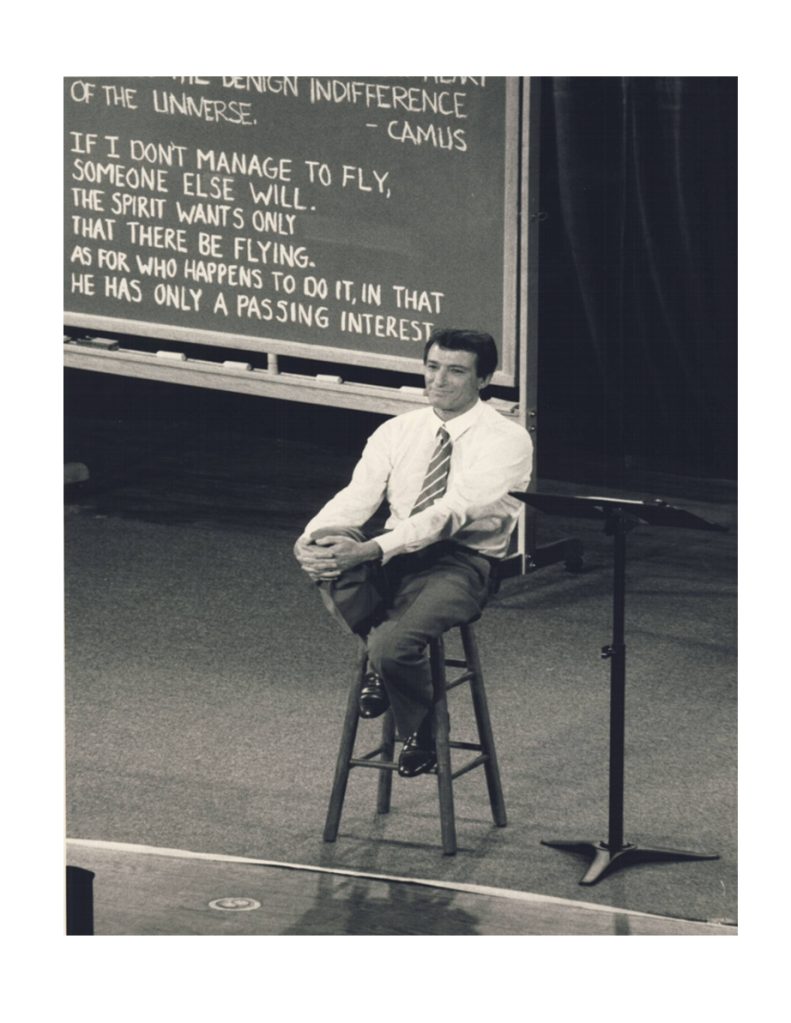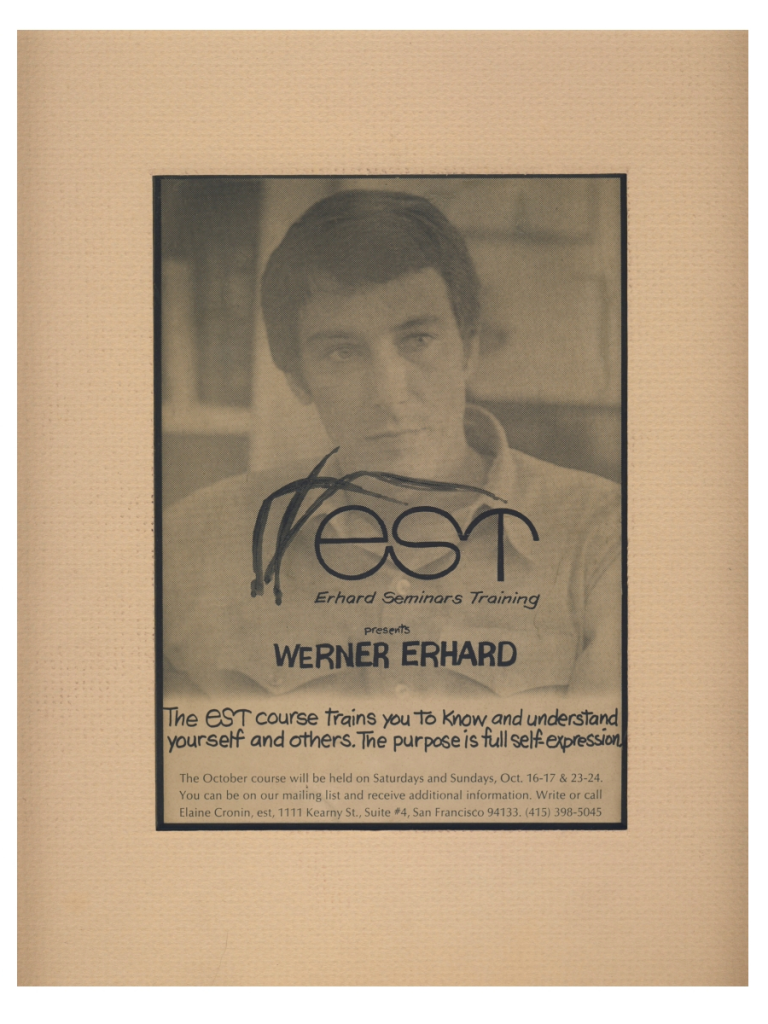Archive for the ‘Werner Erhard’ Tag
The History of The est Training
History of The est Training
1971
- In June Werner Erhard had a realization about the nature of being…
- And in October that realization manifested into the est Training. Werner Erhard first led the est Training in San Francisco at the Jack Tar Hotel and the world of possibility was born.
- Laurel Sheaf named as president and CEO of est
- First est office, 2nd floor on Kearney Street in San Francisco
- Original est staff members included Werner Erhard, Gonneke Spits, Laurel Scheaf, Jack Rafferty and Elaine Cronin
- While only about 600 people participated in est Training by the end of 1971, it was the beginning of something new. The beginning of people getting that what is, is and what isn’t, isn’t and you can choose to be responsible for your life. People took on making a difference in their lives, their community and the world.
Werner Erhard

Werner Erhard quoting Rainer Maria Rilke, “If I don’t manage to fly, someone else will. The spirit wants only that there be flying. As for who happens to do it, in that he has only a passing interest.”
The est Training
“The way est happened was very simple. I had this transformational experience. I had a transformation. Whoever I had been up until that point, I no longer was. And it was on my way to work, and I happened to be – not anything significant about being on the Golden Gate Bridge – but I happened to be there, and that’s when I had the realization that what my life was about was really meaningless. It was empty. And this realization that the things that I thought were so significant, like looking good and winning – just the normal things that I guess most people think are important – that they really had no importance, that it was all empty and meaningless. When I broke through the sadness, broke through the sense of despair at having wasted my life, I all of a sudden realized, “My God, I’m free.” What – free – what does that mean to be free? Free to choose, free to create a life that was worth living. So I took a day with my staff – shared with them the best I could something that would allow them to create for themselves the kind of transformational experience that I had had. And we all decided, okay, we’ll do this. Instead of selling books, we’ll do this.” –Werner Erhard, 2005, from Transformation: The Life and Legacy of Werner Erhard
A World That Works
“We can choose to be audacious enough to take responsibility for the entire human family. We can choose to make our love for the world what our lives are really about. Each of us has the opportunity, the privilege, to make a difference in creating a world that works for all of us. It will require courage, audacity and heart. It is much more radical than a revolution – it is the beginning of a transformation in the quality of life on our planet. What we create together is a relationship in which our work can show up as making a difference in people’s lives. I welcome the unprecedented opportunity for us to work globally on that which concerns us all as human beings.
If not you, who?
If not now, when?
If not here, where?”
Werner Erhard, 1977
Werner Erhard Foundation
“The ultimate purpose of the Foundation is the full realization of the promise of human beings and their institutions. The Foundation’s intention is to create the space for an explosion of knowledge and attainment in the area of human consciousness and human experience similar to the one that occurred 250 years ago in the physical sciences which has dramatically affected humankind’s material well-being.”
-Werner Erhard, October 4, 1973
Werner Erhard Northern Ireland
Werner Erhard in Northern Ireland: Werner Erhard developed the Ireland Initiative for the Mastery Foundation in 1999 in collaboration with Peter Block as a three-day conference to bring together a broad base of community leaders already working on peace and reconciliation in Northern Ireland. The Mastery Foundation continues to lead this course in places where religious differences are a source of conflict, including Northern Ireland and Israel.
Watch this video clip describing Werner Erhard’s work in Northern Ireland.
Capitalism and Society
In their groundbreaking paper published by Yale University’s Center on Capitalism and Society, “Putting Integrity Into Finance: A Purely Positive Approach,” Werner Erhard and Professor Michael C. Jensen discuss their positive model of integrity that links integrity and personal and corporate performance. The creation of this model reveals a causal link between integrity and increased performance. Through the work of clarifying and defining what integrity is and it’s causal link to performance, this model provides access to increased performance for private individuals, executives, economists, philosophers, policy makers, leaders, legal and government authorities.
“The Center on Capitalism and Society brings together leading scholars in economics, business, finance, and law to study capitalist institutions, their effectiveness, and their weaknesses in order to get some answers to such basic questions about capitalism – its working, its dynamism, and the instability it may cause, its inclusiveness or lack thereof and its role in a democracy.”
Breaking Out Of The Box
Social paradigms dictate our behavior and collective values. In the 1950s, the rule was “throw it anywhere, it will go away,” and smokestacks billowing black smoke were a proud symbol of productivity…
While we are in a paradigm, we take its rules and boundaries for granted. It is what we call “reality.” Like eyeglasses with colored lenses, our paradigm colors whatever we perceive. “Most of our notions about the world come from a set of assumptions which we take for granted, and which, for the most part, we don’t examine or question,” says Werner Erhard. “We bring these assumptions to the table with us as a given. They are so much a part of who we are that it is difficult for us to separate ourselves from them enough to be able to talk about them. We do not think these assumptions, we think from them.”
Expressions such as “that’s impossible,” or “that’s not the way we do it around here” speak to the existence of paradigms, or belief systems, that are operating, unseen, in the background. Like water to a fish, they are not recognized by us as our paradigms. Yet, they influence what we think – and even what we see.
Once we recognize that our paradigms are an invisible structure through which we think, the next step is to understand the degree to which they determine what we see and experience. Their influence is far more powerful than we may realize.
Thomas Khun, who in 1962 wrote a seminal book on scientific paradigms called The Structure of Scientific Revolutions, points to an experiment that illustrates the paradigm effect. In the experiment, originally reported in 1949, people were briefly shown a deck of playing cards in which some cards had red spades instead of black. The subjects literally saw the red spades as black, because that’s what they expected. Once the anomaly was pointed out, the subjects had no trouble spotting the red spades. The experiment and others like it led Khun to the conviction that our paradigms act as filters on reality. We never see the world directly; we always see it through these paradigms filters. We never see the world in its entirety; we only see pieces. And our mental frameworks naturally bias us toward only seeing that part of the world that supports our paradigms.
“Our paradigms determine the way the world ‘shows up’ for us,” Says Erhard, “and that allows for only certain possibilities. Our paradigms determine our worldview, the way we perceive things, what we perceive, what we can see as possible, what we can’t see as possible and what we can’t see at all. Ultimately, they limit our strategies and our actions.”
…
The secret of paradigms is that, with them, we construct our own reality. As Thomas Khun said in 1962: “When paradigms change, the world itself changes with them.”
It’s a revolutionary thought, and it is the most important thing to know about paradigms.
How reality occurs – or “shows up” – for people is not determined by what’s there to be seen, but by how we are seeing it.
Erhard says that instead of waiting for a new paradigm to become apparent, we can create and invent futures that “were not going to happen anyway.” He points out that when a breakthrough is needed, what is often called for is the development of a new paradigm.
“Changing the paradigm does not negate the need for realistic, hard-headed thinking,” he says. “In ‘business as usual,’ we get clear about the situation to determine what we can do and what we can’t. But to produce a breakthrough, you have to stand the usual approach on its head.”
The process begins with inventing a new possibility, without regard to whether you know what to do to realize it. You then look back at the situation from the standpoint of that new possibility.
“That is what gives you the new perspective and what allows you to see the situation in a way you haven’t seen it before,” says Erhard. “That is the beginning of generating a new paradigm. Breakthroughs are a product of seeing something in a new way, which enables you to see new opportunities and new openings for action that you couldn’t see before. Breakthroughs come as a result of shifting your commitment from the predictable future to a possible future.”
In so doing, we will – literally – change the world that there is for us to see.
- excerpted from Breaking Out of the Box -A Crash Course in Paradigm Thinking, by Debra Feinstein.
The Erhard Jensen Ontological / Phenomenological Initiative
The Purpose of The Erhard Jensen Ontological / Phenomenological Initiative is to:
Stimulate and support research into the development and application of the ontological / phenomenological laws of human nature and human behavior to the lives of individuals and human entities to reliably and significantly elevate human performance and quality of life. This includes all areas of living across the entire spectrum of human activity, for example:
- Individuals, families and groups
- Public and private organizations such as partnerships, corporations, non-profit and educational entities
- Public agencies and governmental entities
- Bring the ontological / phenomenological model and methodology utilized in this leadership course to education — including research, course development, and teaching.
Stimulate and support research into the study and teaching of the ontological /phenomenological laws of human nature and human behavior, and the impact of these laws on life, living, and self.
For more information see http://www.erhardjensen.org
(Content Curated from the Werner Erhard Biography Website)
 Leave a comment
Leave a comment
